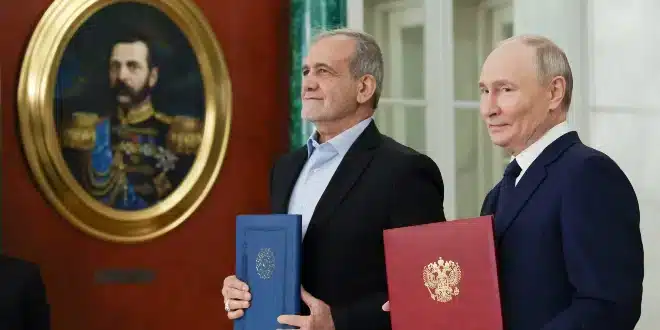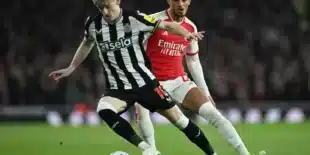Russian President Vladimir Putin and Iranian President Masoud Pezeshkian have signed an all-encompassing cooperation deal as their ties get closer in the midst of ongoing Western sanctions. A “comprehensive strategic partnership treaty” was the tag used to refer to the agreement, which envelops areas ranging from trade to military collaboration, science, education, and culture.
This critical development comes just days ahead of the swearing-in of U.S. President-elect Donald Trump, who has vowed to try to resolve the conflict in Ukraine and take a more assertive stance toward Iran as it faces economic difficulties and battlefield defeats in the Middle East. Kremlin spokesman Dmitry Peskov said the accord was planned many months ago and was not linked to the incoming U.S. administration.
During the talks, Putin expressed optimism about the treaty, stating it would enhance cooperation across all sectors. Pezeshkian, marking his third meeting with Putin since assuming office, described the agreement as a solid basis for advancing bilateral relations. He emphasized the importance of regional countries resolving their issues independently and criticized foreign interventions for creating instability.
The relationship between Russia and Iran has dramatically improved since Russia’s invasion of Ukraine in 2022. Teheran and Moscow have denied the suggestion that Iran is supplying Russia with drones to use in the war, but with both nations under sanctions and pressure from other countries, their mutual alignment has increased. The inclusion of Iran in the BRICS economic bloc only puts a finer point on its closeness to Moscow.
The Russian-Iranian relationship first took a turn for the better after the collapse of the Soviet Union in 1991, when Moscow emerged as a main trading partner and supplier of defense for Tehran. Russia was instrumental in developing Iran’s nuclear energy program and signed the 2015 nuclear deal which lifted sanctions on Iran in exchange for it scaling back its nuclear program. The agreement came under stress after the U.S. pulled out under Trump.
Russia and Iran also allied in the Syrian civil war to prop up Bashar al-Assad’s regime. But the recent ouster of Assad in a surprise opposition surge, and his subsequent fleeing to Russia, has been a severe blow to Iran’s regional reach. Furthermore, Tehran has been at a disadvantage in the light of continuous Israeli military attacks against Iran-aligned factions and its own facilities.
Confronting an expanding array of regional and economic challenges, Iran is receiving state-of-the-art military hardware from Russia, including air defense systems and fighter aircraft, in efforts to shore up its defenses against the perceived threat of Israeli aggression. The deal underlines strategic ties between Moscow and Tehran amid shared challenges and a rapidly changing world environment.


